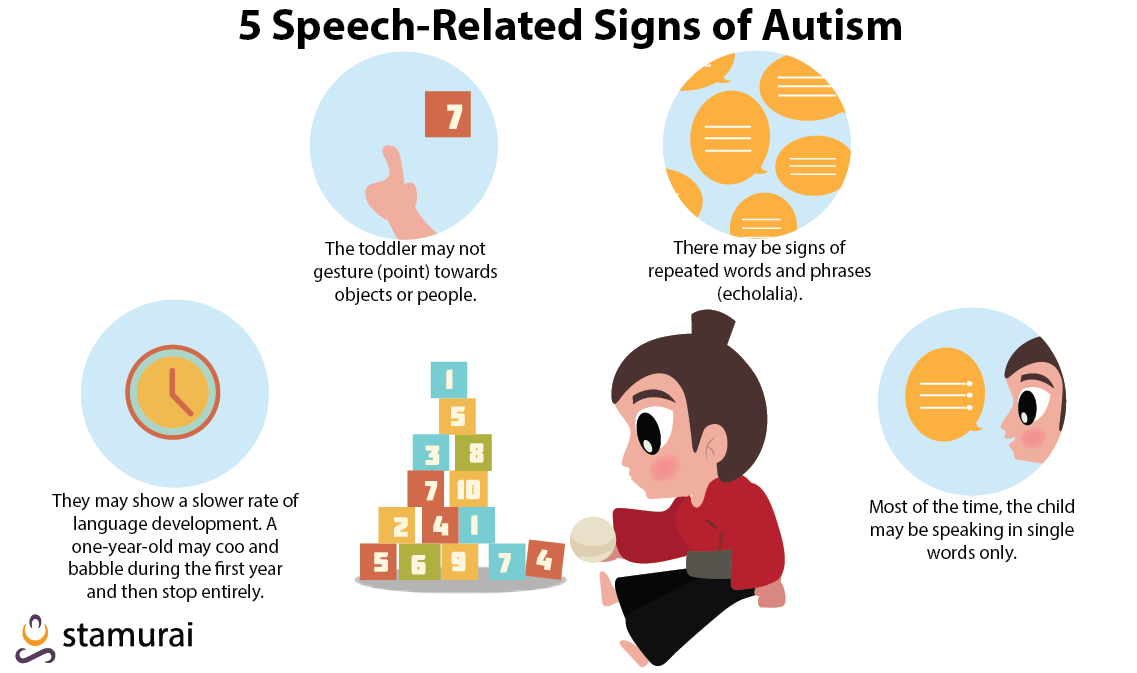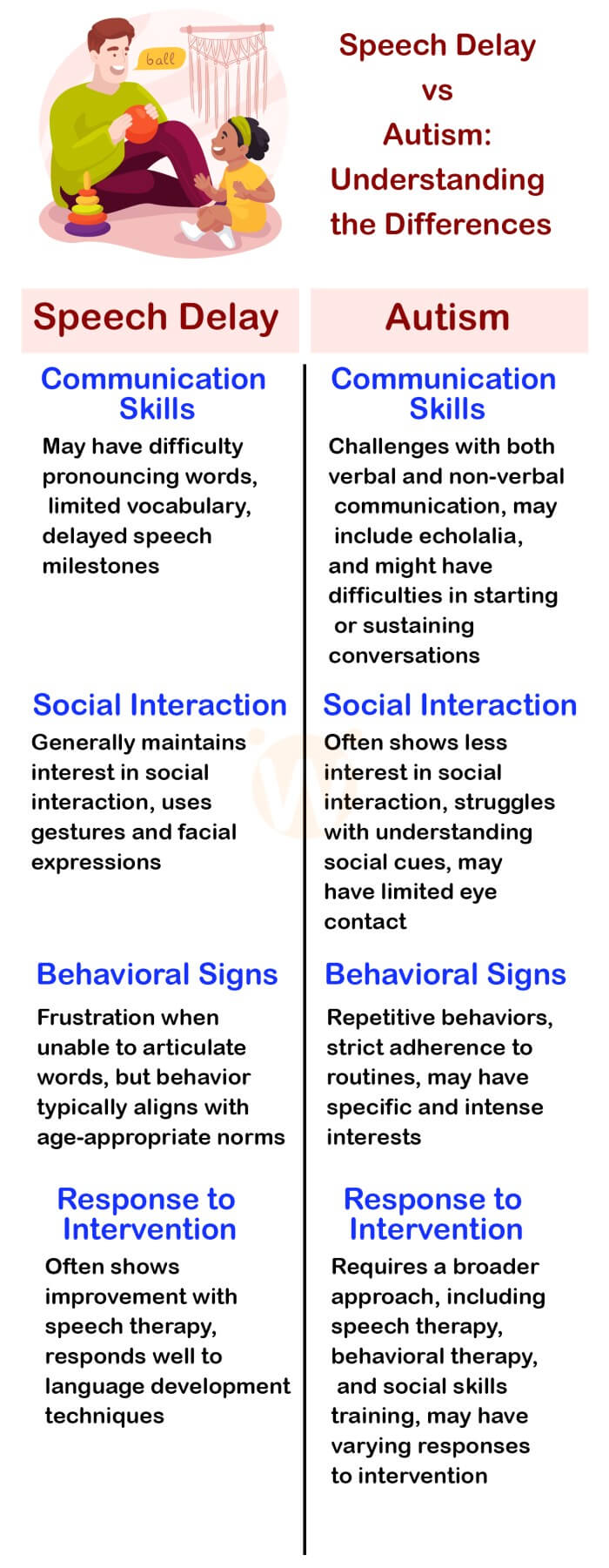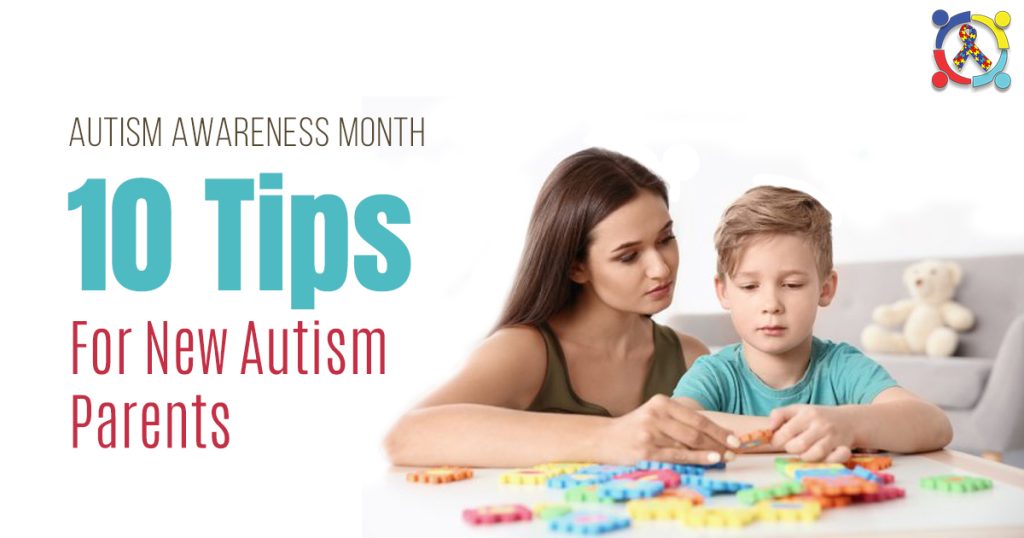Are you worried about your child’s speech delay? You’re not alone.
Many parents find themselves in a similar situation, questioning whether a delay in speech could be a sign of autism. It’s completely natural to be concerned about your child’s development and to seek answers that can help you understand what might be happening.
We’ll dive into the connection between speech delay and autism, providing you with the information you need to make informed decisions. You’ll learn about the signs to watch for, when to seek professional advice, and how to support your child’s communication skills effectively. By the end of this read, you’ll feel more equipped to navigate this challenging yet crucial aspect of your child’s growth. Stay with us, and let’s explore this important topic together.
Speech Delay Vs Autism
Understanding the difference between speech delay and autism is crucial. Parents often worry when their child doesn’t speak on time. Speech delay and autism are distinct conditions. Both can affect communication but in different ways. This section explores the key differences and common misconceptions.
Key Differences
Speech delay is often temporary. Children with speech delay struggle with speaking. They may have trouble forming words or sentences. Autism affects communication and social skills. It involves repetitive behaviors and limited interests. Children with autism may avoid eye contact. They might not respond to their name. Speech delay does not include these social challenges.
Speech delay can be due to various reasons. Hearing problems, lack of stimulation, or developmental delays. Autism is a neurodevelopmental disorder. It has a broader impact on daily life. Early intervention can help in both cases. Identifying the right condition is vital for the right support.
Common Misconceptions
Many believe speech delay always means autism. This is not true. Speech delay can occur without autism. Some think children with autism cannot speak. This is incorrect. Many children with autism do speak. Their speech might be different or delayed.
Another misconception is that speech delay is rare. Speech delay is common in young children. It does not always signal autism. Autism affects social interaction more than speech. Speech delay focuses solely on language skills.
People often confuse the two conditions. They overlap in communication issues but differ in causes and symptoms. Misunderstandings can lead to unnecessary worry. Proper assessment by a professional can clarify concerns.

Credit: www.stamurai.com
Causes Of Speech Delay
Understanding the causes of speech delay is crucial for parents. Speech delay is common in children, and various factors contribute to it. Knowing these factors helps in addressing the issue effectively.
Developmental Factors
Children develop at different paces. This includes speech and language skills. Some may take longer to speak due to slow development. This delay doesn’t always mean a serious issue. Monitoring growth milestones can provide insights. Regular check-ups with pediatricians help in tracking progress.
Environmental Influences
A child’s environment plays a big role in speech development. Interaction with family and peers is essential. Limited exposure to conversations can slow language skills. Reading and talking to children often stimulates their speech. Positive and engaging environments encourage better communication skills.
Genetic Considerations
Genetics can impact speech development. Family history of speech issues might influence a child. If parents had speech delays, children might experience similar patterns. Genetic factors are not always the sole reason. Often, they combine with other influences. Consulting healthcare professionals can clarify genetic impacts.
Indicators Of Autism
Understanding the indicators of autism can be crucial for early intervention. Autism spectrum disorder presents itself in various ways. Parents often worry when they notice speech delays in their children. While speech delay can be a concern, it doesn’t always mean autism. Identifying specific indicators can help differentiate between speech delay and autism.
Behavioral Signs
Children with autism may display repetitive behaviors. These can include hand-flapping or rocking. They might have intense interests in specific topics or objects. Changes in routines can cause distress. Many children with autism show strong reactions to sensory inputs. Loud noises or bright lights might overwhelm them. Observing these behaviors can provide clues.
Social Interaction Challenges
Social interaction is often challenging for those with autism. They might avoid eye contact during conversations. Playing with peers can be difficult. Understanding social cues is often a struggle. They might not respond to their name. Difficulty in forming friendships is common. Recognizing these challenges can be a key indicator.
Communication Difficulties
Communication difficulties are prevalent in autism. Some children might not speak at all. Others might have a limited vocabulary. They might repeat phrases without understanding their meaning. Non-verbal communication can be limited. Gestures and facial expressions might be absent or unusual. Identifying these communication issues can be essential.
Evaluating Speech Delay
Speech delay doesn’t always indicate autism. Various factors contribute to speech delays in children. Early evaluation by professionals helps identify the cause. Understanding the difference can guide better support and intervention.
Evaluating speech delay in children can be a sensitive yet crucial task for parents and caregivers. It’s natural to worry if your child is not speaking as much as their peers. However, understanding whether a speech delay is a sign of autism or just a developmental variation requires careful consideration and knowledge.
Professional Assessments
Seeking a professional assessment is often the first step in understanding a child’s speech delay. Speech therapists and pediatricians are trained to evaluate developmental milestones. They can identify whether the delay is part of a larger pattern of behavior indicative of autism. During assessments, professionals may use standardized tests to measure a child’s speech and language abilities. They will observe how your child interacts with others and their environment. This comprehensive view helps in forming an accurate diagnosis. Professionals might also look at other factors like social skills and repetitive behaviors. These can be indicators of autism spectrum disorder (ASD). It’s important to remember that not all speech delays are linked to autism.
Parental Observations
As a parent, you have a unique insight into your child’s everyday behavior. Your observations are invaluable in the evaluation process. Pay attention to how your child communicates, both verbally and non-verbally. Consider making notes on when your child reaches certain developmental milestones. Does your child understand what you are saying, even if they don’t respond verbally? Observations like these can provide crucial information for professionals. Engage your child in various social settings and note any changes in their communication skills. Are they engaging with other children, or do they prefer playing alone? These observations can help differentiate between a temporary speech delay and something that might require further investigation. Do you notice any patterns or triggers that affect your child’s speech? Sharing these insights with a healthcare provider can lead to more tailored support for your child. Remember, early intervention can make a significant difference in your child’s development.
Intervention Strategies
Understanding the link between speech delay and autism can be challenging. Early intervention strategies are essential for effective support. These strategies focus on improving communication skills. They also aim to help children thrive in their social environments. Let’s explore some key intervention strategies.
Therapeutic Approaches
Therapeutic approaches play a crucial role in addressing speech delays. Applied Behavior Analysis (ABA) is often used. It encourages positive behavior through structured interventions. Social skills training helps children interact better with peers. Occupational therapy addresses sensory processing issues. Tailoring these therapies to each child’s needs is vital.
Speech Therapy Techniques
Speech therapy offers targeted techniques for language development. Articulation therapy focuses on correct sound production. Language intervention activities boost vocabulary and sentence formation. Play therapy uses games to engage children in communication. Regular sessions with a speech therapist make a significant difference.
Parental Support
Parental support is key in a child’s development journey. Parents can create a language-rich environment at home. Reading books and engaging in conversations are effective strategies. Attending therapy sessions helps parents understand their child’s needs. Support groups provide a community for sharing experiences and advice.
Importance Of Early Diagnosis
Understanding the importance of early diagnosis in speech delays can be a crucial step in a child’s developmental journey. When you notice signs of speech delay in your child, it’s natural to worry about autism. However, not all speech delays are indicators of autism. Early diagnosis can help identify the root cause, allowing parents and caregivers to address the issue effectively. Consider how early intervention could make a significant difference in your child’s life.
Benefits Of Timely Intervention
Acting quickly after noticing speech delays can bring about substantial benefits. Early intervention allows you to tailor specific strategies to your child’s needs. For instance, speech therapy might enhance communication skills, providing a foundation for better social interactions. Imagine your child gaining confidence in expressing themselves, leading to improved relationships with peers and family. Timely intervention can be a game-changer, helping your child reach their full potential.
Long-term Outcomes
What could the future hold for your child if speech delays are addressed early? Studies have shown that early diagnosis and intervention can lead to more favorable long-term outcomes. Children who receive help sooner tend to have better academic performance and fewer behavioral issues. Picture your child thriving in school, making friends, and enjoying a richer, more connected life. Early diagnosis isn’t just about solving a problem—it’s about opening doors to a brighter future.
Have you ever wondered what might happen if speech delays are overlooked? Without proper diagnosis, underlying issues might go unnoticed, impacting your child’s development. By seeking early intervention, you’re not only addressing present concerns but also setting the stage for a successful tomorrow.
Myths And Facts
Many parents wonder if speech delay means autism. There are myths and facts about this topic. Understanding these is important for parents concerned about their child’s development. Speech delay is common, but not always linked to autism.
Debunking Common Beliefs
Some believe speech delay always indicates autism. This is not true. Autism includes various symptoms, not just speech delay. Children with autism may show repetitive behaviors and social challenges. Speech delay can happen for other reasons too.
Another myth is that speech delay means low intelligence. Many children with speech delays are smart. They might struggle to express themselves verbally. They may excel in other areas.
Scientific Evidence
Research shows speech delay does not always mean autism. Studies reveal many factors cause speech delay. Hearing issues, developmental disorders, and environmental factors can impact speech development.
Scientists have found links between autism and speech delay. But correlation does not mean causation. Early intervention can help children with speech issues. Therapy can support speech development, regardless of the cause.
Experts recommend evaluations for children with speech delays. Professionals can identify the root cause. They can guide parents on the best steps forward.

Credit: www.mywellnesshub.in
:max_bytes(150000):strip_icc()/is-late-speech-a-sign-of-autism-259888-v2-2cd7a2607c79463db302094da6fbf934.jpg)
Credit: oratoryclub.com
Frequently Asked Questions
At What Age Is Speech Considered Delayed?
Speech is considered delayed if a child isn’t speaking simple words by 18 months or sentences by 3 years. Always consult a pediatrician for personalized advice. Early intervention can improve outcomes.
How To Tell The Difference Between Speech Delay And Autism?
Speech delay involves language skills lagging behind peers, while autism affects social interaction, communication, and repetitive behaviors. Autism often includes sensory sensitivities and difficulty understanding social cues. Speech delay usually improves with targeted therapy. Consulting a specialist can accurately differentiate between the two conditions.
Is It Possible To Have A Speech Delay Without Autism?
Yes, a child can have a speech delay without autism. Speech delays can result from hearing loss, developmental disorders, or environmental factors. Early intervention and therapy often help improve speech skills. It’s important to consult a healthcare professional for accurate diagnosis and treatment.
What Are The First Signs Of Autism In Toddlers?
Toddlers may show signs like delayed speech, limited eye contact, and repetitive behaviors. Difficulty in social interaction and sensitivity to sensory input are also indicators. Watch for lack of interest in peers or toys and unusual attachment to objects. Early detection leads to better support and intervention.
Conclusion
Speech delay doesn’t always mean autism. Various factors affect speech development. Early intervention can help identify underlying issues. Consulting professionals offers guidance and clarity. Parents should observe their child’s communication patterns. Each child is unique with individual growth timelines. Recognizing this helps in providing proper support.
Regular communication with specialists is beneficial. Understanding and patience are crucial for progress. Embrace your child’s journey with love and encouragement. This creates a supportive environment for growth. Always stay informed and seek professional advice. With awareness, parents can nurture their child’s development effectively.

